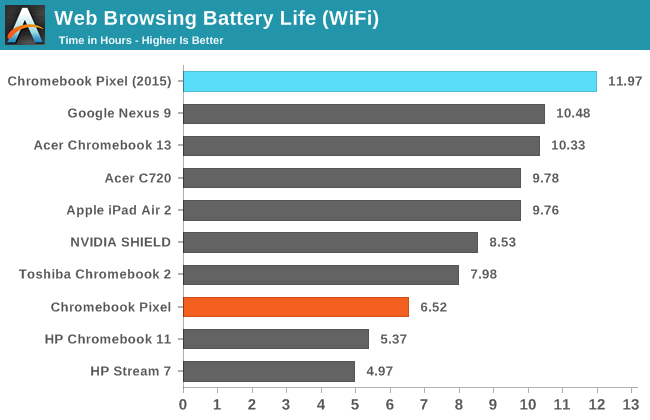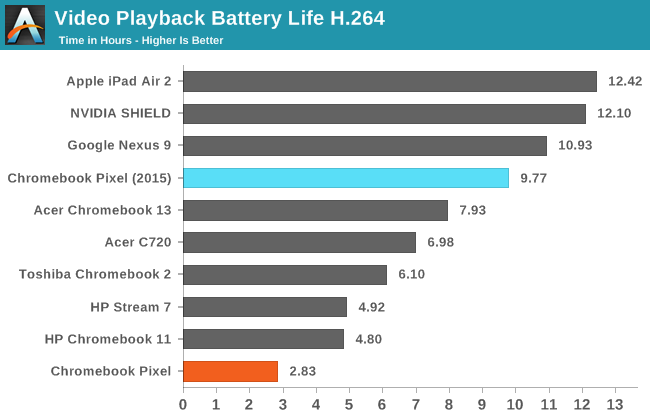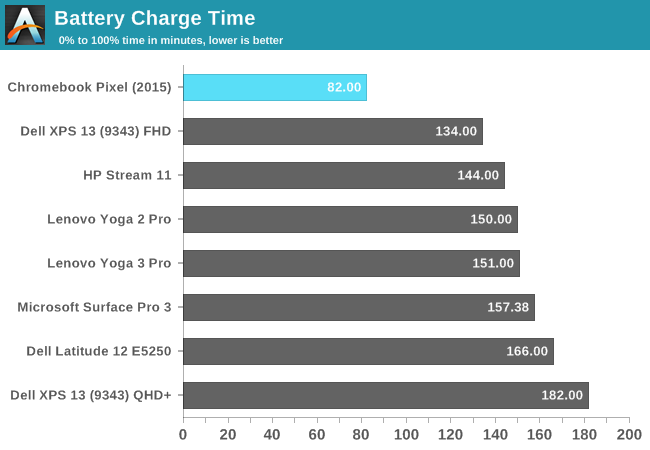The Chromebook Pixel (2015) Review
by Brandon Chester on March 16, 2015 8:00 AM EST- Posted in
- Laptops
- Chrome OS
- Chromebook
- Chromebook Pixel
Battery Life
One area where Google claims to have made large improvements over the original Pixel is battery life. The 2013 version of the Pixel would typically manage six or seven hours of battery life, which was decent but not outstanding at the time. Given that the Pixel did not run much more than a web browser, it was actually somewhat disappointing to see it falling behind other laptops like the 13" MacBook Pro with Retina display which was substantially more powerful and capable. Google claims that the new Chromebook Pixel will achieve up to twelve hours of battery life, which is quite a lofty goal considering it is around twice the battery life of the original. Given that the new Pixel has the same 59 Wh battery as its predecessor, all of the battery life improvements have to come from reduced component power usage and software optimizations.
The two main areas where power usage has been reduced are the CPU and the display. The CPU is one of Intel's new Broadwell-U processors, built on their 14nm manufacturing process. While it is faster than the Ivy Bridge Core i5 used in the original Pixel, it has significantly reduced power usage due to architectural improvements and the move from a 22nm to a 14nm fabrication process. The display is similar to the original, but Google is now using Content Adaptive Backlight Control (CABC) to manage backlight brightness based on the display's Average Picture Level (APL), as well as Panel Self Refresh (PSR). It should be noted that although PSR is a display feature, it's actually a method of reducing CPU/GPU and display bus power usage, not LCD panel power usage.
To see if Google achieved their goal of a twelve hour battery life, I have run the Pixel through our standard web browsing test as well as our H.264 video playback test.


In our WiFi web browsing test, the Pixel is only two minutes short of Google's up to twelve hours rating, and with that battery life it sits well above all the other tablets and Chromebooks. In our video playback test it still performs very well with 9.77 hours, but it doesn't end up lasting quite as long as some of the most recent tablets. Regardless, the battery life in both scenarios is an absolutely massive improvement over the original Pixel, with almost two times the battery life during web browsing and over three times the battery life when playing back videos.
Charge Time
As mentioned earlier, the new Chromebook Pixel uses USB Type-C for charging. Since the Pixel has a Type-C port on each side, you can charge it from both the left and the right. While this doesn't sound like a big deal, it can be the difference between charging and not charging in situations where you're far from an outlet. It is also just a great connector in general, and the fact that it is just USB means that you can use a USB Type-A to Type-C cable to charge off of any existing USB port, with the caveat that it's going to charge slower. Google includes a 60W USB Type-C charger with the Pixel, and offers a Type-A to Type-C cable for $12.99.

The Pixel does exceptionally well in our charge time test, reaching a full charge nearly an hour quicker than the XPS 13 which was previously the quickest to charge. The quick charging combined with the extremely long battery life should ensure that Pixel users are never stuck tethered to a power outlet.










123 Comments
View All Comments
chlamchowder - Monday, March 16, 2015 - link
But since you have a Windows machine already, why spend the extra money on a Chromebook when that machine can already cruise the internet (and more)?It's like having a car, and then buying another car...
Hanoveur - Monday, March 16, 2015 - link
Okay, I'll drag my desktop PC downstairs just to cruise the web when I'm watching TV. That makes sense.steven75 - Wednesday, March 18, 2015 - link
Or replace the desktop with one real $1,000 laptop like everyone else?Hanoveur - Wednesday, March 18, 2015 - link
I guess I don't want to be like everyone else since I build my own PCs.coder543 - Monday, March 16, 2015 - link
I disagree with that comment, but sure, believe whatever you want to about Chrome OS.For 95% of consumers, an iPad is all they need for their daily computational lives. They literally *Do not* need a full computer. A Chromebook is like an iPad with a keyboard, USB ports, and flash player. It really is good enough for the majority of consumers. For the people who need more, Crouton allows you to easily have access to a true Linux desktop environment in parallel with ChromeOS -- switching between them with a keyboard shortcut. Full Linux is sufficient for anyone who doesn't require exact pieces of specialized software, which is the vast majority of people. They may have preferences for pieces of software, but there are Linux equivalents that are awesome in most cases.
So, no, this is not a toy computer, and no, you don't "need" to own a real computer in addition to it.
I really wish it had more storage by default -- that is a fair criticism. Everything about this device is justifiable except that, which is just a poor decision by Google.
chlamchowder - Monday, March 16, 2015 - link
The storage limitation is justifiable if it's used as a thin client.What turns me off is that it is a thin client. It's expensive and/or difficult to get a very high speed internet connection. ISPs in the US just aren't that good. When traveling, it might even be impossible (and Chromebooks are laptops/ultrabooks...see where the problem is?). But that's how it was designed.
andychow - Monday, March 16, 2015 - link
That's why I love it. I don't understand people "only 32GB". Really? That sounds overkill. Under normal circumstances, it's a device you will never store any files on.It's a thin client, but a nice one with no lag, a nice screen and great battery life. I'm getting one to replace my other chromebook.
Hanoveur - Monday, March 16, 2015 - link
I use a Synology NAS as extra storage for all the computers in my home, including my Chromebook. I have my own private cloud. But then again, some people are digital packrats...they want to make sure they have terabytes of movies and music with them at all times for some strange reason...and then they lose their devices and media. Not to mention the amount of time they spend transferring it all.ppi - Monday, March 16, 2015 - link
Cloud storage (even home NAS) will not save you if you are on the travel. Especially in Europe - imagine you go with family skiing to Austria, and you want to have along some movies for your kids. Data roaming is insanely expensive (think €50 for 10MB data) and WiFi in hotels or rented apartments is not standard either.Also, i7 on a device that can do only as much as Chromebook is a waste. Core-M would be more appropriate.
cjb110 - Tuesday, March 17, 2015 - link
your skiing in Austria and you take a laptop with you? why? who cares what laptop is? The scenario you've invented makes little sense for any laptop Windows, Apple or Google.